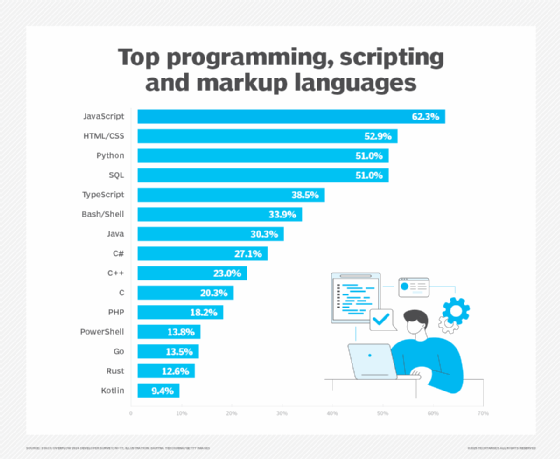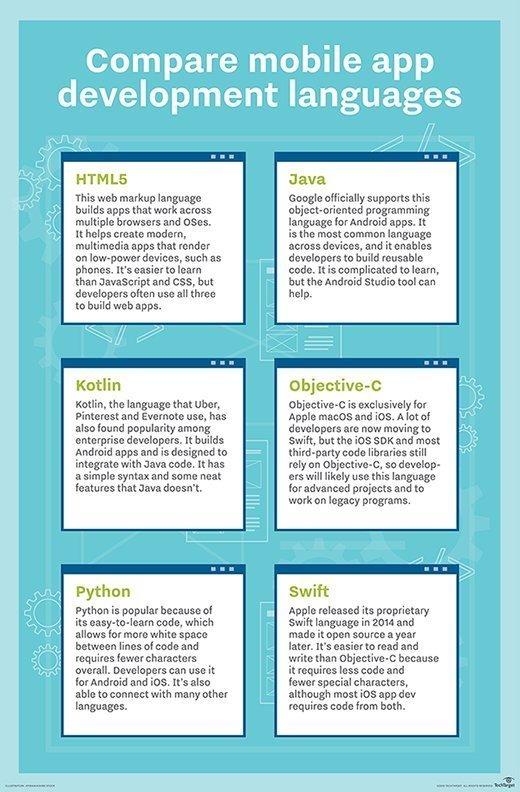
Maksim Kabakou - Fotolia
Kotlin vs. Swift: An open source programming language face-off
Take a look into what Kotlin and Swift have to offer in terms of cross-platform capabilities, library support and ease of use. Also, review their major strengths and limitations.
Kotlin and Swift are two popular open source programming languages, both designed to offer speed, safety and concise app development. These two languages have traditionally been associated with mobile development, but they're capable of server-side and web development as well.
Kotlin shares several attributes with Java and was designed to streamline Android app development. Apple's Swift, on the other hand, was designed to interface with C-based code and libraries, providing an open source approach for iOS and OS X app development. However, both languages boast the ability to delve into both the world of Android and iOS, leaving many developers at a crossroads where they must choose one language over the other.
In this article, we compare Kotlin vs. Swift. Examine the advantages of these open source programming languages, as well as the limitations. And consider the library support these languages provide, their ease of use and the cross-platform capabilities they deliver.
Kotlin pros
Kotlin is a statically typed, general-purpose language that runs on the Java Virtual Machine (JVM) and easily integrates with Java classes. Programmers can compile Kotlin code on multiple platforms, including web, Android, iOS and desktop platforms.
Kotlin uses the Low-Level Virtual Machine (LLVM) compiler framework to optimize runtimes. LLVM's library for programmers to perform just-in-time code compilation ensures that all code runs smoothly within another program, whether that's an interpreter or runtime for a specific language. Users can develop common structures and patterns by accessing functions and global variables through LLVM APIs.
For resources, Kotlin developers can access the Arrow library. This library provides patterns, type classes, data types and integration specifications.
Kotlin gives programmers the benefits of null safety, data classes and domain specific language creation. Both its clean syntax and efficient support from the IntelliJ IDEA Java integrated development environment help to ease Kotlin's learning curve.
Kotlin cons
Kotlin is relatively new as an open source programming language for mobile and other apps. This means it has a smaller community than other languages, and minimal resources for programmers to turn to for solutions to problems.
There is also the chance that combining new Kotlin code with a JVM could produce extraneous amounts of code to manage and process, increasing the JVM runtime.
Swift pros
Similar to Kotlin, Swift is a general-purpose, compiled programming language. It integrates with Objective-C code. In fact, it arguably improves on Objective-C through extra flexibility, concise syntax and ease of use.

Through Swift, developers can access Cocoa, Apple's native object-oriented API; and Cocoa Touch, a development environment to build iOS apps. Swift developers can also use Vapor and Kitura, two web frameworks that offer stable building environments for server-side application projects.
SwiftUI is Apple's framework to design user interfaces in a declarative mode across all devices. And Swift TensorFlow offers a powerful tool for machine learning design and numerical computing. Apple provides and supports the Swift Package Manager, and the Automatic Reference Counting feature can automatically track and manage memory usage as an application scales.
Swift's type safety and strong error handling help simplify bug fixes, reduce the programming burden for developers and prevent code failures and production errors.
Swift includes a Swift compiler targeting both ARM and x86 Android platforms, along with a Swift Foundation framework that is available for both iOS and Android. However, Swift can only be used in apps that target iOS 7 and later; support is lacking for earlier iOS versions.
Swift cons
While it is cross-platform, Swift is not equally an Apple and Linux product. Swift on Linux is still immature. Programmers who want to work with server-side Swift must contend with limited Linux libraries, unresolved compiler bugs and lack of a common build tool for Swift on Linux.
In addition, due to Swift's frequent updates, developers can face challenges finding the right tools to perform key tasks. While the language benefits from Apple support, the XCode IDE often lags behind in terms of tooling for efficient refactoring and code compiling. And since Swift is a newer open source programming language, it offers a limited number of native libraries. To compensate, the Cocoa Pods dependency manager offers an ample number of libraries and simplifies library implementations and updates.
Kotlin vs. Swift
While Kotlin improves on many aspects of Java, questions persist as to whether it will become a go-to language, as Java is now. Coding in Kotlin requires effort, and may be more complex to learn than Java. But despite the learning curve and a still-growing community, programmers already regularly use Kotlin to build business-facing and commercial apps. Kotlin-based apps run in small startups and large enterprises.
By comparison, Swift improves on Objective-C, rather than using Java frameworks and libraries. Some argue that this gives Kotlin an advantage over Swift, saying Java offers more library support for functions. Also, the rigidity of the Apple framework ecosystem and key attributes, such as delegation, data sources and flat class hierarchies, pose fundamental limitations.
However, Swift gains points for its cross-platform capabilities. For instance, the Fusion framework can facilitate calls for Android functionality from apps built in Swift. The fact that the language can address both iOS and Android development needs is a big advantage, especially for iOS developers who are interested in jumping to Android.

Ultimately, you have to choose the open source programming language that you and your development team are most comfortable with. Consider the Kotlin vs. Swift points covered here, especially when it comes to depth of functionality, cross-functional programming capabilities and ease of use for novice developers and programmers.








